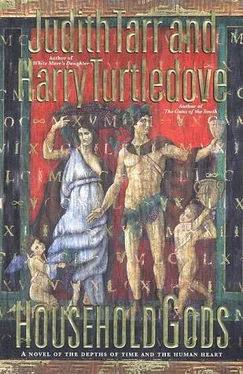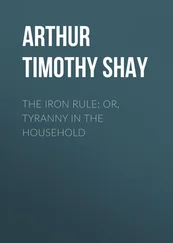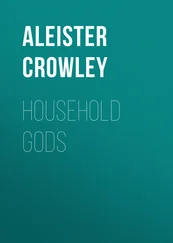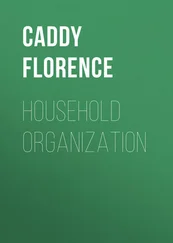Judith Tarr - Household Gods
Здесь есть возможность читать онлайн «Judith Tarr - Household Gods» весь текст электронной книги совершенно бесплатно (целиком полную версию без сокращений). В некоторых случаях можно слушать аудио, скачать через торрент в формате fb2 и присутствует краткое содержание. Жанр: Фэнтези, на английском языке. Описание произведения, (предисловие) а так же отзывы посетителей доступны на портале библиотеки ЛибКат.
- Название:Household Gods
- Автор:
- Жанр:
- Год:неизвестен
- ISBN:нет данных
- Рейтинг книги:5 / 5. Голосов: 1
-
Избранное:Добавить в избранное
- Отзывы:
-
Ваша оценка:
- 100
- 1
- 2
- 3
- 4
- 5
Household Gods: краткое содержание, описание и аннотация
Предлагаем к чтению аннотацию, описание, краткое содержание или предисловие (зависит от того, что написал сам автор книги «Household Gods»). Если вы не нашли необходимую информацию о книге — напишите в комментариях, мы постараемся отыскать её.
Household Gods — читать онлайн бесплатно полную книгу (весь текст) целиком
Ниже представлен текст книги, разбитый по страницам. Система сохранения места последней прочитанной страницы, позволяет с удобством читать онлайн бесплатно книгу «Household Gods», без необходимости каждый раз заново искать на чём Вы остановились. Поставьте закладку, и сможете в любой момент перейти на страницу, на которой закончили чтение.
Интервал:
Закладка:
Next to the charming oven stood a large pot full of grain, and what she recognized after a moment as a mill. She fed a few grains of — wheat, she supposed it was — into the opening of the upper stone, then turned it. A sprinkling of flour sifted out of the bottom. She lifted a pinch of it between thumb and forefinger and tasted it. It wasn’t Gold Medal quality, coarse and a little gritty, but it hadn’t come from a factory the size of a city block, either. She’d made it with her own hands. She knew exactly where it came from, and how it got there, too.
She smiled proudly at it. How wonderful. How beautifully natural.
She walked across the rammed-earth floor to the front door, which was made the same way as the one in her room. This time, she opened it without hesitation or fumbling. Learning this first trick of living in Carnuntum made her as proud as if she’d just passed the bar exam.
The view from the doorway was a wider version of the one she’d had from her upstairs window. A building or two down from hers, several large stones were set crosswise in the street, sticking up several inches above the unpaved dirt. An oxcart rolled and squeaked past them without trouble. She saw that its wheels fit into deep ruts in the dirt, evidently a standard width apart.
So why the stones?
Dust. Dirt. Rain — of course, she thought. The stones would help a pedestrian cross from one side of the street to the other without sinking up to her knees in mud.
While she was congratulating herself on having solved yet another mystery of this brave new world, the fellow in the oxcart waved in friendly fashion and said, looking straight at her, “Good morning, Umma! I’ll have some lettuces to sell you next week.”
Nicole felt the heat rise to her cheeks, the hammering in her breast — panic again. She fought it as she’d learned to do at moot court in law school: by turning her back on it and concentrating on her response. “That’s good,” she said, carefully speaking in Latin. The man waved again and went on. She sagged against the doorframe, weak with relief. He hadn’t noticed anything odd.
While she got her wits back together, a woman came past walking an ugly little dog on a leather leash. She nodded to Nicole. People knew this Umma, and apparently liked her, or at least respected her. Nicole was a stranger here, but Umma wasn’t. How in the names of Liber and Libera was she supposed to find her way with people whom she’d never seen before in her life, but who expected her to know everything about them?
She could do it. She knew she could. This wasn’t Los Angeles. This was a simpler world, a purer world, brighter and more innocent, if not exactly cleaner. It couldn’t be as sexist as the world she came from, and it certainly couldn’t be so rampantly unjust. People would accept her because they were conditioned to accept her. She wouldn’t have to fight constant paranoia and mistrust, gender-bashing and racism and discrimination and all the rest of it. Here she could be what she fundamentally was: not a pair of boobs and a skirt, not a gringa, not a yuppie, but a plain and simple human being.
Her hand, she discovered, had risen to the side of her jaw. Damn that tooth. Tylenol would take care of it, but they wouldn’t have that here. They probably didn’t even have aspirin.
“I’ll just have to make the best of it,” she said to herself. “I can do that. I can.”
Someone opened the front door of the building across the street: a stocky, balding man with a dark beard going gray. The sign above the door read, TCALIDIUSSEVERUSFULLOETINFECTOR, all the letters run together. Nicole needed a moment to separate one word from the next in her mind — T. CALIDIUS SEVERUS, FULLO ET INFECTOR — and another to read in Latin instead of English. It came to Titus Calidius Severus, fuller and dyer — after a moment’s alarm at infector, which meant different things in English and Latin.
The man stabbed the pointed bottom of a large amphora into the dirt just to one side of the doorway. He waved and grinned at her. The grin showed a gap here and there. “Morning to you, Umma,” he called. “You look pretty today. But then,” he added, “you look pretty every day.”
“Er — thank you,” she said. Exactly how well did Umma and this — Calidius? — know each other?
Well, she thought with an inner headshake, that didn’t matter, not anymore. She was her own person here. She would make up her own mind.
The fuller and dyer retreated into his shop. Nicole had barely begun to relax before he came out again carrying another amphora, which he thrust into the ground on the other side of his doorway. He waved again, this time without the grin and the greeting, and went back inside. His building looked like hers: one story in front, two in the back, living quarters set over a shop. From the look of the buildings up and down the street, this whole district was much the same.
A man in a dirty gray tunic paused in front of Calidius’ shop. He hiked up the tunic. Nicole, staring in blank astonishment, saw that he wore no drawers, or loincloth either. He took himself in hand, casual as if he did this every day, and urinated into one of the amphorae. A strong yellow stream arced out and down, dwindled, dribbled, and gave out. He shook himself once or twice, let the tunic drop, and went on his way with a sigh of relief and a nod for Nicole.
It took all she could do to nod back. Every instinct of Midwestern upbringing and Los Angeles survival training was yelling in outrage. But there was no mistaking what the two tall jars were for, or that the man had simply been doing what was, for this place and time, his civic duty.
So did the next one who came by, a man of much higher social status from the look of his crimson tunic and halfway clean toga. He was as casual as the first one had been, as coolly matter-of-fact, and as unconcerned by the presence of a spectator — and a female spectator at that.
Wonderful, she thought. I’ve got a public pissoir across the street from my restaurant. That should do wonders for business.
Nicole Gunther-Perrin would have marched straight off to complain to Calidius. But Nicole Gunther-Perrin was wearing the body of a woman named Umma. Should she, shouldn’t she? What could she get away with?
While she dithered, she became aware, distinctly and unmistakably, that someone had come up behind her. Whoever it was was silent, and she certainly couldn’t see through the back of her head, but for the first time in her life she realized someone was nearby solely by smell. With a gasp she regretted as soon as it was out, she spun.
The woman who d come up behind her gasped, too, in evident alarm, and ducked her head so low that she seemed to be babbling into the loose fold of tunic over her ample breasts: “I’m sorry, Mistress Umma, I’m sorry, I’m sorry! I didn’t mean to startle you. Please believe me.”
“It’s all right,” Nicole said automatically. She was shaking, not so much from startlement now as from the proximity of another human being from this world, this time. People passing by, people across the street, were distant enough that she could, if she had to, pretend that they didn’t count. There was no pretending this woman was anything but real. Every sense said so: sight, sound, smell so strong she could taste it — and, if she dared reach out, she could touch, too. She kept her hand in a fist at her side, and, as she’d done when she first woke, took refuge in the recording of details.
The woman was younger than she was, somewhere in her twenties, maybe, and half a head taller than Nicole — than Umma. However tall that was. Her skin was fairer than Umma’s, almost like Nicole’s own. Her eyes were gray, her hair neither blond nor brown and very, very dirty, rudely hacked into a bob like those of Liber and Libera on their votive plaque.
Читать дальшеИнтервал:
Закладка:
Похожие книги на «Household Gods»
Представляем Вашему вниманию похожие книги на «Household Gods» списком для выбора. Мы отобрали схожую по названию и смыслу литературу в надежде предоставить читателям больше вариантов отыскать новые, интересные, ещё непрочитанные произведения.
Обсуждение, отзывы о книге «Household Gods» и просто собственные мнения читателей. Оставьте ваши комментарии, напишите, что Вы думаете о произведении, его смысле или главных героях. Укажите что конкретно понравилось, а что нет, и почему Вы так считаете.












